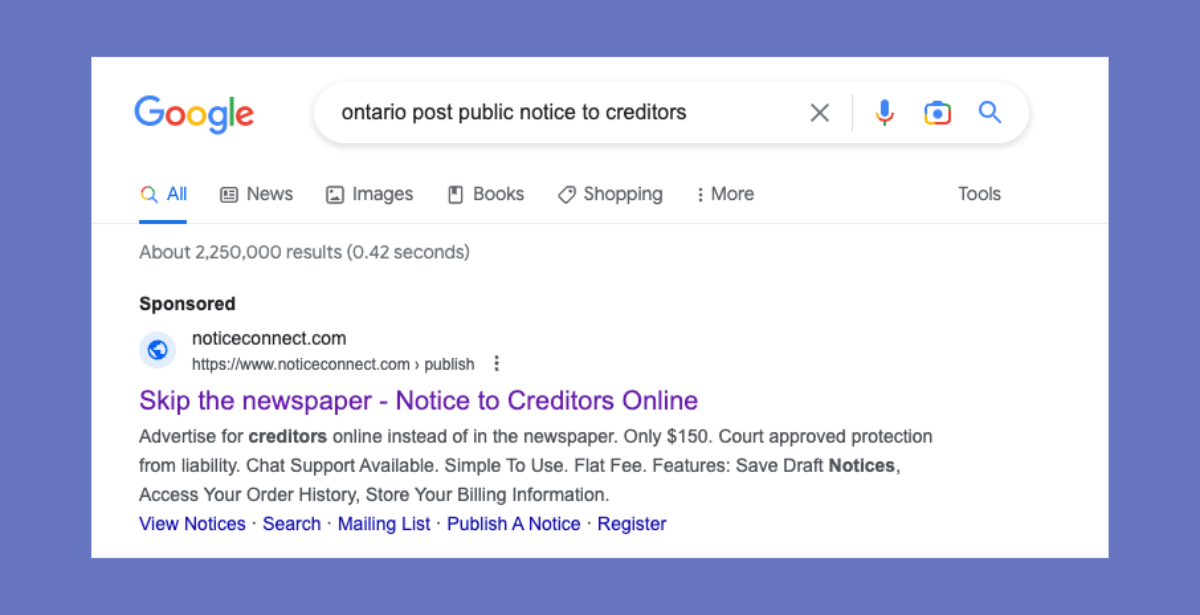Estate Settlement
May 01, 2025
What to Do When Someone Dies in California
Follow this step-by-step guide to navigate legal duties, probate, and estate tasks with clarity and confidence.
Notifying creditors of a death is one of the first step you need to take as an estate administrator, here's how to do it;


One of the first steps in the probate process is notifying possible creditors and/or claimants (those who are owed funds or other assets) of the deceased’s estate so they may collect the funds owed to them.
Notifying potential creditors through a formal process, usually involving posting a notice to creditors in a local and/or national newspaper for a certain period. More on that is below.
The reason this is one of the first steps in the probate process is due to how the assets of the estate are paid out. Prior to any assets being distributed to beneficiaries, the estate will need to repay any expenses (funeral costs, court fees, etc.) as well as any legitimate claims.
If this step is missed or intentionally glossed over during probate, then a claimant could come forward demanding funds legally owed to them which you will be obligated to pay, regardless of how much (if any) funds are left in the estate.
However, if you do file a notice to creditors, then once the limitation period has passed–usually 30-120 days–then any claims that come forward may not be valid (depending on state laws). At the very least, any claim brought forward after this date will be harder to process.
If any legitimate claims do become due, nonetheless, you as the executor will not be in a financially precarious position by paying these debts up-front–as they should be.
Given the importance of circulating the notice proficiently so all possible creditors can be notified, your state’s laws may require you to publish the notice in a national paper (or online) in addition to posting it in the newspaper in the county of the probate court overseeing the probate of the decedent's estate.
Quick Insight: Doing a quick google search "city of probate+ post public notice" will help you quickly find a public notification service.

Once you have found the proper paper(s) to inform about your notice, make sure to research your state’s statute requirements for preparing a notice. This legislation will tell you what information you need to include.
Below is a quick-access chart to various statutes that describe the requirements for a notice of creditors:
| State | Statue |
| Tennessee | TN Code § 30-2-306 (2021) |
| California | Sec. 9050-9054 |
| Florida | Sec. 733.2121 |
| Texas | Estates Code Ch. 308 |
Once you have a completed draft, be sure to contact the relevant paper(s) to inform them of your desire to publish a notice to creditors. Usually, this will cost around a few hundred dollars, but this expense is considered tax deductible, as it is part of the estate administration process.
To save you some time (and an inevitable headache) here are some components that you must include in your notice:
To give you a more concrete idea as to what this looks like, below is a sample notice taken from the McKenzie Banner published in Tennessee:
NOTICE TO CREDITORS: Estate of Jane Doe, deceased. Notice is hereby given that on the 27th day of October, 2022, letters testamentary (or of administration as the case may be) in respect of the estate of Jane Doe, who died September 27, 2022 were is- sued to the undersigned by the Juvenile and Probate Court of Lauderdale County, Tennessee. All persons, resident and non-resident, having claims, matured or unmatured, against the estate are required to file the same with the Clerk of the above named Court on or be- fore the earlier of the dates prescribed in (1) or (2) other- wise their claims will be forever barred: (1)(A) Four (4) months from the date of the first publication (or posting, as the case may be) of this notice if the creditor received an actual copy of this no
Once you have a draft notice created, we recommend reviewing it against other public notices in your state. If you feel out of your depth when drafting this document, we recommend getting in touch with an estate professional.
As previously noted, the length of a notice to creditors must remain in the newspaper and will depend on the regulations of the state it is published in. Generally speaking, a notice will typically run anywhere from several days to a few weeks.
However, it is pertinent that you continue to take proactive measures and contact any claimants you may know of while the notice is in publication.
Taking preventative measures like this will mitigate any potential risks of claimants alleging that they were not properly notified, which may slow the probate process considerably.
At ClearEstate, we pride ourselves on offering services that are affordable, custom-tailored to your needs, and easy to understand. If you are feeling overwhelmed as a newly-appointed executor, send us a message. We’re here to make the complex steps of probating an estate simple for you.
 Simplify Probate Today
Simplify Probate Today
Get expert guidance from our specialists who've helped 10,000+ families.
Book a free consultation